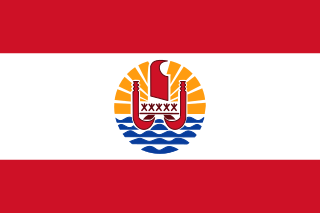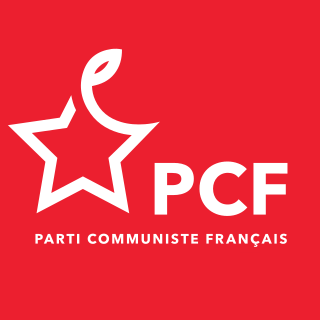Conservatism is a political and social philosophy promoting traditional social institutions in the context of culture and civilization. The central tenets of conservatism include tradition, human imperfection, organic society, hierarchy, authority, and property rights. Conservatives seek to preserve a range of institutions such as religion, parliamentary government, and property rights, with the aim of emphasizing social stability and continuity. The more traditional elements—reactionaries—oppose modernism and seek a return to "the way things were".

The European United Left/Nordic Green Left is a left-wing political group in the European Parliament established in 1995.

French Polynesia is an overseas collectivity of the French Republic and its sole overseas country. It is composed of 118 geographically dispersed islands and atolls stretching over an expanse of more than 2,000 kilometres (1,200 mi) in the South Pacific Ocean. Its total land area is 4,167 square kilometres (1,609 sq mi).

The Federalist Party, referred to as the Pro-Administration party until the 3rd United States Congress as opposed to their opponents in the Anti-Administration party, was the first American political party. It existed from the early 1790s to the 1820s, with their last presidential candidate being fielded in 1816. They appealed to business and to conservatives who favored banks, national over state government, manufacturing, and preferred Britain and opposed the French Revolution.
In the administrative divisions of France, the department is one of the three levels of government below the national level, between the administrative regions and the commune. Ninety-six departments are in metropolitan France, and five are overseas departments, which are also classified as regions. Departments are further subdivided into 334 arrondissements, themselves divided into cantons; the last two have no autonomy, and are used for the organisation of police, fire departments, and sometimes, elections.
The Whigs were a political faction and then a political party in the parliaments of England, Scotland, Great Britain, Ireland and the United Kingdom. Between the 1680s and 1850s, they contested power with their rivals, the Tories. The Whigs' origin lay in constitutional monarchism and opposition to absolute monarchy. The Whigs played a central role in the Glorious Revolution of 1688 and were the standing enemies of the Stuart kings and pretenders, who were Roman Catholic. The Whigs took full control of the government in 1715 and remained totally dominant until King George III, coming to the throne in 1760, allowed Tories back in. The Whig Supremacy (1715–1760) was enabled by the Hanoverian succession of George I in 1714 and the failed Jacobite rising of 1715 by Tory rebels. The Whigs thoroughly purged the Tories from all major positions in government, the army, the Church of England, the legal profession and local offices. The Party's hold on power was so strong and durable, historians call the period from roughly 1714 to 1783 the age of the Whig Oligarchy. The first great leader of the Whigs was Robert Walpole, who maintained control of the government through the period 1721–1742 and whose protégé Henry Pelham led from 1743 to 1754.
Right-wing politics hold that certain social orders and hierarchies are inevitable, natural, normal, or desirable, typically supporting this position on the basis of natural law, economics, or tradition. Hierarchy and inequality may be viewed as natural results of traditional social differences or the competition in market economies. The term right-wing can generally refer to "the conservative or reactionary section of a political party or system".
The National Rally, until June 2018 known as the National Front, is a right-wing populist and nationalist political party in France. Most political commentators place the RN on the far-right, but other sources suggest that the party's position on the political spectrum has become more difficult to define clearly. Owing to the French electoral system, the party's representation in public office has been limited despite its significant share of the vote. Its major policies include opposition to French membership in NATO, European Union, the Schengen Area, and the Eurozone. As an anti-European Union party, the National Rally has opposed the European Union since its creation. The party also supports greater government intervention in the economy, protectionism, a zero tolerance approach to law and order, and significant cuts to legal immigration.

Hồ Chí Minh, born Nguyễn Sinh Cung, also known as Nguyễn Tất Thành,Nguyễn Ái Quốc, Bác Hồ or simply Bác ("Uncle"), was a Vietnamese Communist revolutionary leader who was Chairman and First Secretary of the Workers' Party of Vietnam. He was also Prime Minister (1945–1955) and President (1945–1969) of the Democratic Republic of Vietnam. He was a key figure in the foundation of the Democratic Republic of Vietnam in 1945 at the Ba Dinh Square in Hanoi as well as the People's Army of Vietnam and the Viet Cong during the Vietnam War.

The provinces and territories of Canada are sub-national governments within the geographical areas of Canada under the authority of the Canadian Constitution. In the 1867 Canadian Confederation, three provinces of British North America—New Brunswick, Nova Scotia, and the Province of Canada —were united to form a federated colony, becoming a sovereign nation in the next century. Over its history, Canada's international borders have changed several times, and the country has grown from the original four provinces to the current ten provinces and three territories. Together, the provinces and territories make up the world's second-largest country by area.

The French Communist Party is a communist party in France.

The Union for a Popular Movement was a centre-right political party in France that was one of the two major contemporary political parties in France along with the centre-left Socialist Party (PS). The UMP was formed in 2002 as a merger of several centre-right parties under the leadership of President Jacques Chirac. In May 2015, the party was renamed and succeeded by The Republicans.

The Radical-Socialist and Radical Republican Party was a liberal and formerly social-liberal political party in France. It was also often referred to simply as the Radical Party, or to prevent confusion with other French Radical parties as the Parti radical valoisien, abbreviated to Rad, PR, or PRV.
Centre-right politics or center-right politics, also referred to as moderate-right politics, are politics that lean to the right of the left–right political spectrum, but are closer to the centre than other right-wing politics. From the 1780s to the 1880s, there was a shift in the Western world of social class structure and the economy, moving away from the nobility and mercantilism, as well as moving toward the bourgeoisie and capitalism. This general economic shift toward capitalism affected centre-right movements such as the British Conservative Party, that responded by becoming supportive of capitalism.

The Democratic Movement is a centrist political party in France that is characterised by a strong pro-European stance. MoDem was founded by François Bayrou to succeed the Union for French Democracy (UDF) and contest the 2007 legislative election, after his strong showing in the 2007 presidential election. Initially named the Democratic Party, the party was renamed "Democratic Movement", because there was already a small Democratic Party in France. MoDem secured an agreement with En Marche! in the 2017 legislative election after Bayrou endorsed the candidacy of Emmanuel Macron in February. In June 2017, the MoDem and its MEPs were accused of potentially fictitious employment practices within the European Parliament. Bayrou resigned on 21 June from his post as Justice Minister soon after he became embroiled in the fictitious employment scandals, and allegations of harassment against a journalist reporting on the scandal.

The Socialist Party is a social-democratic political party in France and was, for decades, the largest party of the French centre-left. The PS used to be one of the two major political parties in the French Fifth Republic, along with the Republicans. The Socialist Party replaced the earlier French Section of the Workers' International (SFIO) in 1969, and is currently led by First Secretary Olivier Faure. The PS is a member of the Party of European Socialists (PES), the Socialist International (SI) and the Progressive Alliance.

The Republicans is a centre-right, Gaullist, conservative political party in France.
La République En Marche!, sometimes called En Marche!, is a centrist, liberal and social-liberal political party in France. It was founded on 6 April 2016 by Emmanuel Macron, a former Minister of Economy, Industry and Digital Affairs, who was later elected President of the French Republic in the 2017 election with 66.1% of the second-round vote. Macron considers La République En Marche! to be a progressive movement, uniting both the left and the right.












